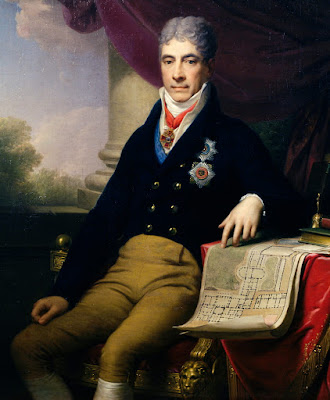 |
| Andrey Razumovsky from 1810 by Austrian artist Lampi the Younger |
Caroline Shaw: Valencia, Schumann: Quartet in A, Op.41 No.3, Caroline Shaw: Entr’acte, Beethoven: Quartet in E minor, Op.59 No.2 ‘Razumovsky’; Kyan Quartet; Conway Hall Sunday Concerts
Reviewed 8 December 2024
The young Kyan Quartet bring fine grained tone and fine classical style to a programme that moved from Beethoven to Schumann to contemporary composer Caroline Shaw
On 8 December 2024, the Kyan Quartet (Naomi Warburton, Sydney Grace Mariano, Wanshu Qiu and Simon Guémy) made their appearance at Conway Hall Sunday Concerts in a programme that combined Caroline Shaw‘s Valencia and Entr’acte with Robert Schumann’s Quartet in A, Op.41 No.3 and Beethoven’s Quartet in E minor, Op.59 No.2 ‘Razumovsky’. Before the concert, I gave a pre-concert talk, Past, Present and Future introducing the composers and their works.
Formed in 2020 at the Royal Academy of Music, the Kyan Quartet brings together players from UK, the USA, China and France, and they are one of this year’s City Music Foundation artists. Back in 2022, Florence Anna Maunders caught them at Wigmore Hall in a programme of Haydn, Fanny Mendelssohn and Jessie Montgomery [see Florence’s review]
At Conway Hall they began with Caroline Shaw’s 2012 piece, Valencia, inspired both by her own performing and by the humble orange. It began light and transparent in texture, with the melodic basis of the work gradually appearing on the cello. The whole displayed Shaw’s delight in varied textures combined with regular repeated patterns, all engagingly presented by the quartet.
They followed this with the third of Robert Schumann’s quartets, all three written in one mad rush in 1842, prefiguring a six month period when Schumann’s manic focus turned to chamber music and he produced most of his best chamber works. The quartet made the introduction into a gentle drawing in of the listener, ‘let me tell you a story’, then the main part of the movement was presented with graceful elegance. The four players had a lovely fine-grained sound, each line characterful and intimate, beautifully and individually phrased. They brought a classical feel to the piece, rather than a big romantic sound, as if we were listening to early Schumann on the piano. The second movement was light, mobile and impulsive with well characterised variations full of contrasts from light to strong to vigorous. The third movement was smoothly flowing with intertwining, this mood alternating with something more intense and mysterious. The finale was full of perky rhythms with a nice off-beat quality to them, and a series of highly characteristic episodes, the whole ending energetically in a mood that was highly rhythmically alert.
Another Caroline Shaw piece opened the second half, Entr’acte from 2012, inspired by her listening to the Brentano Quartet performing one of Haydn’s Opus 77 quartets. It began in an intimate, engaging manner with an impulsive feel to the phrases, as the work developed Shaw delighted in seeming to pull the music in an out of focus, weaving moments of aural madness into more structural elements and creating a series of magical transitions between moods, styles and states, but finally the opening material returned and the piece evaporated.
Beethoven’s Razumovsky Quartets have become core parts of the repertoire, but when they were written they extended the quartet genre beyond the normal polite aristocratic salon. Here was music written for a professional string quartet, music that made composers and performers alike realise the potential of the genre. We heard the second of the three quartets Beethoven wrote for Andrey Razumovsky, the Imperial Russian ambassador in Vienna.
The introduction combined the uncompromising with a sense of the intimate and mysterious, leading to an account of the main movement that was urgent and controlled, never over the top but quietly compelling. Like their performance of the Schumann quartet, the Kyan Quartet brought a classical poise to this music and rarely, if ever, went for the big romantic gesture or meatily expressive tone. All was focused, poised and fine grained. The second movement was quietly concentrated with moments that were barely there, always with a clarity and lightness to the textures. The scherzo was lightly tone, yet the irregularity in the rhythms was brought out. The finally was tightly controlled, rhythms were tight yet there was a lightness of touch to it, with drama only coming in the development section.
The blog is free, but I’d be delighted if you were to show your appreciation by buying me a coffee.
Elsewhere on this blog
- Love Lines: deep emotions & island soundscapes in London Sinfonietta’s programme of contemporary Scottish music at Kings Place – concert review
- György Kurtág, Dietrich Fischer Dieskau & Christmas in Regensburg: three personal recordings projects for baritone Benjamin Appl – interview
- Engaging zest: Mike Leigh’s production of Gilbert & Sullivan’s The Pirates of Penzance at ENO with a cast mixing innocence & experience – opera review
- English lyricism and dramatic power: the varied songs of Thomas Pitfield from James Gilchrist and Nathan Williamson – record review
- A sense of place, engagement & sheer enjoyment: In Copisteria del Conte exploring 18th century chamber music from Genoa – record review
- A memorable & touching portrait of an oft-misunderstood composer: words & music by Gustav Holst at the London Song Festival – concert review
- An evening of compelling and involving theatre: Britten, Weill and Ravel triple bill at the Royal College of Music – opera review
- Sight and sound: Holst’s The Planets reimagined for the Father Willis organ at Salisbury Cathedral by John Challenger – record review
- Melodies without Borders: two Turkish musicians mixing lyric melancholy with 19th century bravura – concert review
- Letter from Florida: Sarasota Opera Concert Performance, The Music of Giuseppe Verdi – concert review
- Home


.jpg?w=998&resize=998,665&ssl=1)







